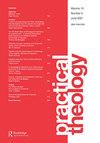Stanley Hauerwas and ‘Chan Tai-man’: an analysis of Hong Kong laypeople's lived theology and Hong Kong theologians’ engagement with Stanley Hauerwas's political theology from a practical theology perspective
IF 0.4
0 RELIGION
引用次数: 0
Abstract
ABSTRACT Hong Kong Christian communities often draw upon theological resources from the West. But can Western theological sources be meaningfully applied to Hong Kong? Western theological sources stem from Western epistemologies, which may not necessarily resonate with the values or cultural assumptions of Hong Kong Christians. The lived experiences of ‘Chan Tai-man,’ a placeholder name for average Hong Kong Christians, can be a source for exploring Hong Kong Christian epistemologies. ‘Chan's’ lived theology has significance for the field of practical theology in considering how majority world epistemologies can impact the Western world, especially regarding Christianity in individualistic societies. This paper analyses Hong Kong theologians’ engagement with Stanley Hauerwas's theological convictions and makes a critical comparison to ‘Chan's’ lived theology. First, the article will address (1) why Hauerwasian theology resonates with Hong Kong theologians and (2) why Hong Kong Hauerwasians think Hauerwas's ideas would be useful in the Hong Kong context. Second, after explaining the author's ethnographic research methods, the article will illustrate ‘Chan's’ lived theology, followed by a comparison between the two approaches. In conclusion, while Hong Kong theologians’ engagement with Hauerwas makes an adequate start, Hong Kong Christian communities’ understanding of political theology will eventually have to be broadened through a critical self-reflection of Hong Kong lived theology.豪尔华与陈泰民:香港世俗神学与香港神学家参与豪尔华政治神学的实践神学分析
摘要香港基督教社区经常利用西方的神学资源。但是,西方神学的来源是否可以有意义地应用于香港?西方神学来源于西方认识论,这些认识论可能不一定与香港基督徒的价值观或文化假设产生共鸣。“Chan Tai-man”是香港普通基督徒的占位符,他的生活经历可以成为探索香港基督教认识论的来源陈的“活神学”在实践神学领域具有重要意义,因为它考虑了多数世界的认识论如何影响西方世界,尤其是关于个人主义社会中的基督教。本文分析了香港神学家对豪尔瓦斯神学信仰的参与,并与陈的生活神学进行了批判性比较。首先,本文将探讨(1)为什么豪尔瓦神学与香港神学家产生共鸣;(2)为什么香港豪尔瓦人认为豪尔瓦的思想在香港背景下是有用的。其次,在阐述了作者的民族志研究方法之后,本文将阐述陈的生活神学,并对这两种方法进行比较。总之,虽然香港神学家与豪尔瓦斯的接触有了一个良好的开端,但香港基督教社区对政治神学的理解最终必须通过对香港生活神学的批判性自我反思来扩大。
本文章由计算机程序翻译,如有差异,请以英文原文为准。
求助全文
约1分钟内获得全文
求助全文

 求助内容:
求助内容: 应助结果提醒方式:
应助结果提醒方式:


